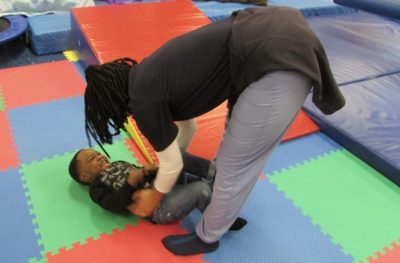Acute therapy providers for disabled kids just can’t catch a break — and neither can the kids’ parents, who for the past two years have consistently fought against sweeping cuts speech, physical and occupational therapy providers for their children.
They’re about to renew that fight again this week, at a hearing Wednesday in which the Texas Health and Human Services Commission will for the umpteenth time hear their pleas asking the commission not to slash Medicaid therapist reimbursement rates — for the second time since December.
The kids whom these therapy providers serve have conditions including cerebral palsy, autism, spina bifida and traumatic brain injuries. With speech, physical, and/or occupational therapies, they learn basic skills such as eating, pointing, talking and walking. In July 2015, the Legislative Budget Board sought to slash funding for the therapists’ Medicaid reimbursement rates by $350 million over two years — cuts that did not begin taking effect until December after parents and providers sought, ultimately unsuccessfully, to block the cuts in federal court. Now, the Health and Human Services Commission is seeking to cut reimbursement rates by up to 46 percent, depending on the type of treatment.
Therapy providers have repeatedly feared that these cuts are simply unsustainable for smaller providers, which, if some close their doors, may cause a shortage in therapists — and will ultimately cause an access-to-care problem that affects Texas’s most vulnerable children, who are stuck on waiting lists.
“Providers are already at the point where they budgeted themselves out to break even, and then depending on how they provide services, [the new proposed cuts] can be a totally unsustainable — especially because in the last year or so you’ve already cut your employees’ pay once,” said Gabriel Dinn, chief administrative officer of Kids’ Developmental Clinic. “To have to do it again within the year, obviously everyone’s going to be averse to that, but some people just can’t sustain [the business] if their therapists leave as a result, or maybe they don’t have a large enough operation to continue. So it’s just been a huge compilation of hits to the way the industry is funded in the last year that have caused it to be more difficult to operate.”
More than a dozen providers — primarily including providers in the Early Childhood Intervention program, which has been dramatically affected — have stopped serving disabled kids as a result of the cuts. The most recent provider to back out is Easter Seals East Texas, which announced in April that it will no longer be able to offer speech, physical and occupational therapy to 230 children through its Early Childhood Intervention program. The kids need will need to go elsewhere for care.
The Legislature has at least appeared aware of the impact that these cuts have had on patients and providers: In the forthcoming budget, lawmakers tried to restore some of the funding to the disabled kids’ acute therapy programs, ostensibly to make up for plummeting the industry into unrest. A rider in 2018-2019 budget — which is expected to be finished this week — includes an order to the Health and Human Services Commission to restore 25 percent of the funding that had previously been stripped from the Medicaid therapy programs during the last funding rout. It also directs the commission to “ensure that any funds restored through this rider are fully reflected in the reimbursement rates paid to providers of acute therapy services.”
Which seems at odds with the proposed cuts to those reimbursement rates that will be considered this very same week.
HHSC spokeswoman Carrie Williams said the agency is “closely monitoring the budget decisions” and will ensure that the proposed reimbursement rates align with the final appropriations.
“We have to make sure kids have the services they need and that we are responsible with taxpayer dollars,” she said in an email. “We are monitoring the situation to ensure access to care is not impacted and that Texans around the state receive the much-needed therapies.”
Bethany Dibble, an administrator and occupational therapist with Kids Developmental Clinic, said she was the one to break the news to KDC therapists that their pay was being cut yet again. She called the staff together for a meeting, and inevitably there was grumbling. Dibble even talked to one therapist later who told her he thought it was time for him to leave the field — exactly what she and scores of other providers have feared.
But Dibble said many others were ready to take their complaints to the Legislature, and KDC will be airing those grievances at the hearing Wednesday.
“We are really encouraging all the therapists to fight with us,” Dibble said. We need everyone to gather and fight. I hate using that word. But that’s really what it’s come down to.”
Published by: Houston Press
Author: Meagan Flynn
Original Link: http://www.houstonpress.com/news/therapists-for-disabled-kids-brace-for-another-round-of-proposed-medicaid-rate-cuts-9461173
